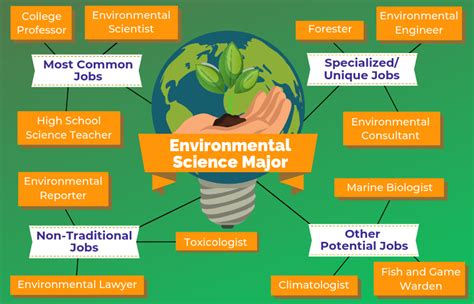Thriving In Environment Science & Studies Careers

If you’re passionate about protecting the environment and making a positive impact on the world, then a career in environmental science and studies may be for you. This field covers a wide range of topics, including climate change, sustainability, conservation, and pollution. In this article, we’ll explore how to thrive in environment science and studies careers.
1. Choose a relevant degree
One of the first steps towards a career in environmental science and studies is choosing a relevant degree. Some popular options include:
- Bachelor of Science in Environmental Science
- Bachelor of Arts in Environmental Studies
- Bachelor of Science in Sustainability
- Bachelor of Science in Conservation Science
It’s important to research different degree programs to find the one that best fits your interests and career goals. Consider factors such as program curriculum, faculty expertise, and research opportunities.
2. Gain hands-on experience
While earning your degree, it’s important to gain hands-on experience through internships, research projects, and volunteer work. This will not only enhance your resume but also give you a better understanding of the field and help you make connections with professionals in the industry.
Look for opportunities to work with organizations such as:
- The Environmental Protection Agency (EPA)
- The National Park Service
- The Nature Conservancy
- Greenpeace
You can also reach out to local organizations and government agencies to see if they have any volunteer or internship opportunities available.
3. Develop specialized skills
Environmental science and studies careers require a range of specialized skills, including:
- Data analysis
- GIS mapping
- Environmental law and policy
- Climate modeling
- Project management
Consider taking courses or pursuing certifications in these areas to develop your skills and make yourself a more competitive candidate for jobs.
4. Network with professionals
Networking is a key part of any successful career, and environmental science and studies is no exception. Attend conferences, join professional organizations, and connect with professionals in your field on LinkedIn and other social media platforms.
Some relevant organizations include:
- The Society for Conservation Biology
- The Association for Environmental Studies and Sciences
- The American Geophysical Union
- The Environmental Defense Fund
5. Stay up-to-date on industry trends
The field of environmental science and studies is constantly evolving as new research is conducted and policies are implemented. Stay up-to-date on industry trends by reading industry publications, attending conferences and webinars, and following relevant organizations and thought leaders on social media.
6. Consider advanced degrees
For certain careers in environmental science and studies, an advanced degree may be necessary or beneficial. Some options include:
- Master of Science in Environmental Science
- Master of Public Policy with a concentration in environmental policy
- Doctor of Philosophy in Environmental Science
Research different programs and requirements to determine if pursuing an advanced degree is the right choice for you.
7. Pursue a career in a relevant field
Environmental science and studies careers can be found in a wide range of industries, including:
- Government agencies
- Non-profit organizations
- Environmental consulting firms
- Energy companies
Research different industries and career paths to find the one that best fits your interests and career goals.
8. Build a strong resume and portfolio
When applying for jobs in environmental science and studies, it’s important to have a strong resume and portfolio that showcases your skills and experience. Consider including:
- Relevant coursework and certifications
- Research projects and publications
- Internship and volunteer experience
- Skills such as data analysis, GIS mapping, and project management
9. Prepare for interviews
When preparing for job interviews in environmental science and studies, research the company and industry beforehand and be prepared to discuss relevant topics such as sustainability, climate change, and conservation. Practice answering common interview questions and be ready to provide examples of how you’ve applied your skills and experience in previous roles.
10. Stay motivated and passionate
Environmental science and studies careers can be challenging but also incredibly rewarding. Stay motivated and passionate about your work by focusing on the positive impact you’re making on the world and staying connected to others in your industry who share your values and goals.
Conclusion
Thriving in environmental science and studies careers requires a combination of education, hands-on experience, specialized skills, networking, and a passion for making a positive impact on the world. By following the tips outlined in this article, you can set yourself up for a successful and fulfilling career in this important field.
FAQs
What industries hire environmental science and studies professionals?
Environmental science and studies professionals can be found in a variety of industries, including government agencies, non-profit organizations, environmental consulting firms, and energy companies.
What degree do I need for a career in environmental science and studies?
Popular degree options for careers in environmental science and studies include Bachelor of Science in Environmental Science, Bachelor of Arts in Environmental Studies, Bachelor of Science in Sustainability, and Bachelor of Science in Conservation Science.
What specialized skills do I need for a career in environmental science and studies?
Environmental science and studies careers require a range of specialized skills, including data analysis, GIS mapping, environmental law and policy, climate modeling, and project management.
